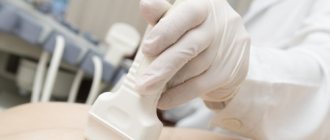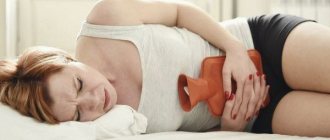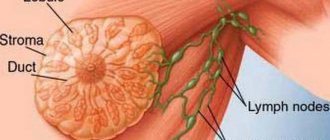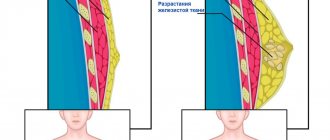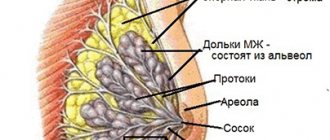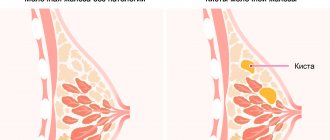The condition of the mammary glands is closely related to the functioning of the woman’s reproductive system and hormonal balance. It is for this reason that during menstruation the breasts hurt, increase in size, and their sensitivity increases. Sometimes this does not pose a threat, but in some cases it may indicate the onset of a serious illness. Therefore, if during menstruation your nipples hurt, or stabbing or aching pain appears, the problem should not be ignored. Contacting a specialist will allow you to accurately determine the cause of the discomfort and receive recommendations for correcting the condition.
Why does chest pain occur?
Usually, a girl experiences chest pain in the middle of her cycle; sometimes the discomfort is so strong that it is impossible to touch the mammary glands, and they begin to ache when moving. This condition is a physiological norm and is associated with ovulation and hormonal changes in a woman’s body.
Ovulation
The menstrual cycle lasts on average almost a month (28-32 days). Ovulation occurs on days 15-16 of the cycle. During this period, the egg leaves the follicle inside the ovary and begins to move through the fallopian tubes into the uterine cavity. Ovulation lasts 4-6 days - this is the only period in the menstrual cycle when a woman can become pregnant.
During ovulation, the ovaries, pituitary gland and adrenal cortex release certain sex hormones: estrogen, progesterone, prolactin and oxytocin. The first two are responsible for the thickening of the endometrium - the mucous membrane of the uterus, to which the fertilized egg should attach. But the last two hormones cause discomfort in the chest, so it’s worth talking about them separately.
Effect of hormones
During ovulation and menstruation, the breasts begin to ache due to the action of two hormones: prolactin and oxytocin.
These active substances are needed so that the female mammary glands begin to secrete milk after the birth of the child. Every month the body prepares for pregnancy and releases oxytocin and prolactin from the pituitary gland. They bind to breast cells and cause blood with nutrients, fats and proteins to flow to the breasts. A significant increase in blood pressure leads to painful sensations, an increase in the size of the mammary glands by 1.5-2 times, and their engorgement - thickening.
When menstruation arrives, the level of these hormones quickly drops, breast swelling subsides, it gradually decreases and on the 4-5th day of menstruation it stops hurting until the next ovulation.
Breast swelling and pregnancy
If your period has not arrived, and your breasts swell with greater intensity, then pregnancy can be assumed.
There are women who ovulate twice in one cycle. In such cases, there may be menstruation and pregnancy at the same time.
The process is very simple: two eggs are released from the ovary a week apart. The first of them is not fertilized, menstruation begins. At this moment, the second can safely merge with the sperm. In this case, a woman’s breasts may swell, as expected, one or two weeks before menstruation, but after menstruation the symptoms will not disappear.
In both the first and second cases, you must definitely consult a doctor to confirm or refute the pregnancy and make sure that it is progressing correctly.
Causes of chest pain during menstruation
From the above, it becomes clear that the peak of discomfort in the mammary glands occurs during the period of ovulation, and chest pain during menstruation should not be so intense and pass quickly, because pregnancy has not occurred. But sometimes pain persists until the end of menstruation and even longer, this is due to various reasons.
Changes in hormonal levels
With the onset of menstruation, the hormonal background quickly changes, prolactin and oxytocin cease to be released in large quantities from the pituitary gland, and estrogen and progesterone predominate in the body, which “guide” the removal of the uterine mucosa during menstruation. If the body is not quickly rebuilt or the balance between these female hormones is disturbed, then the mammary glands hurt longer. In this case, you need to find the cause of the hormonal imbalance. If it is associated with stress or fatigue, then the body will recover and the next cycle will proceed normally. But sometimes hormonal levels are disrupted by more serious factors.
Gynecological diseases
Many gynecological diseases provoke long-term discomfort in the mammary glands, sometimes because of them the breasts hurt throughout the menstrual cycle, and during ovulation and menstruation the soreness increases. Such violations include:
- endometriosis;
- ovarian cyst;
- multifolliculosis;
- uterine fibroids;
- neoplasm in the mammary glands.
These gynecological diseases disrupt the synthesis of estrogen and progesterone, and breast cancer increases the effect of prolactin and oxytocin, so breast tenderness increases and lasts longer. The disease may be accompanied by pain in the lower abdomen and copious discharge.
Ectopic pregnancy
Ectopic pregnancy is a phrase that frightens many girls who want to get pregnant. This phenomenon is accompanied by implantation of a fertilized egg not into the wall of the uterus, but into the fallopian tube. Can my breasts hurt because of this?
An ectopic pregnancy causes a serious hormonal imbalance, because the egg does not attach to the uterus, the body “thinks” that pregnancy has not occurred, removes the endometrium and muffles the release of prolactin and oxytocin. But after a week, the egg releases signaling substances, reporting the development of the fetus. The body is “stunned”, it again triggers the release of prolactin and oxytocin, poorly regulating their levels.
This explanation, of course, is exaggerated, but it fully reflects the picture. An ectopic pregnancy provokes the appearance of pain 1-1.5 weeks after the end of menstruation - this is one of its main symptoms, and pain, the appearance of a tummy, and bleeding appear much later.
Prevention of pain
Reducing the risk of developing breast diseases and disorders that cause pain and other problems is much easier than it seems at first glance. You just need to follow simple but important rules:
- eat right, give up fatty, spicy, salty foods, include more dairy products, meat, fish in your diet
- quit smoking
- do not abuse alcoholic beverages
- organize your daily routine correctly, leaving enough time for rest
- do not exercise, avoid excessive physical activity during menstruation
- do not overexert yourself – neither emotionally nor physically
- do not expose the body to high temperature changes - overheating, hypothermia
- wear convenient, comfortable, appropriate-sized underwear that does not cause discomfort while wearing
- Regularly - once every six months - undergo examination by a gynecologist
Any deviations from the norm, be it pain in the mammary glands, discharge from the nipples, pulling, unpleasant, painful sensations in the lower abdomen in the middle of the menstrual cycle - all this is a serious reason for immediately contacting a gynecologist. Only a correct diagnosis and timely treatment will help avoid dangerous and unpleasant consequences.
Character of chest pain during menstruation
To understand whether you should worry about breast pain during menstruation, the nature of the pain, which can be:
- cyclical;
- non-cyclical.
Cyclic chest pain in a woman is normal; it appears and ends at approximately the same time in the cycle, and is not acute, but aching in nature. A girl should mark in her calendar not only the beginning and end of menstruation, but also chest pain, because a change in their cyclicity indicates hormonal or age-related changes. Non-cyclical pain is the opposite of the previous one. It can appear at any time of the menstrual cycle, is acute, and is most often associated with serious hormonal disorders, gynecological diseases, breast tumors or muscle strain. If non-cyclical chest pain bothers a woman for more than two months, then she should consult a mammologist and gynecologist.
Oncological diseases
There can be many reasons why the mammary glands hurt during menstruation. But the most serious among others remains the risk of breast cancer. This is the most common type of cancer among women in the world, but such a diagnosis will not be a death sentence if it is detected in the early stages. To do this, you need to conduct regular self-examination and undergo a professional examination twice a year by a mammologist.
If a woman identifies suspicious lumps in the breast area or axillary lymph nodes, she should immediately consult a specialist.
There are several methods for determining the presence of cancer cells:
- MRI (magnetic resonance imaging) of the chest;
- ductography with contrast - an image of the breast using the injection of a contrast agent;
- tumor marker - a special analysis that determines the presence of protein compounds that appear only in the presence
- tumors;
- breast puncture is an analysis of tumor material, which is obtained by inserting a needle into the lump and
- collection of biomaterial;
- mammography - ultrasound of the breast;
- Histology analysis - analysis of neoplasm tissue.
All of them are effective and proven. Most are painless and therefore will not cause much discomfort, but will provide peace of mind and confidence in your own health.
Painful sensations in the chest, nagging pain, swelling of the nipples - all these are normal processes during the period of ovulation, menstruation, pregnancy and childbirth, and lactation. All of them are accompanied by active hormonal changes in the female body and are allowed by doctors. But it is important that the level of pain in any of these periods should be tolerable and not cause any particular discomfort. It is also normal if your breasts hurt during menstruation, but not after it ends. If the pain does not go away or its level is too intense, this is the first sign that a woman needs to visit a mammologist.
Symptoms
The following symptoms of chest pain should alert girls and cause a visit to a mammologist and gynecologist:
- acute pain on palpation of the chest;
- excessive compaction of the mammary glands;
- sore nipples;
- the presence of individual lumps in the chest that can be felt during self-examination;
- pain is accompanied by dizziness, fever, nausea;
- breast tenderness does not stop after menstruation.
Diagnostics
If alarming symptoms are detected, you should contact a mammologist and gynecologist. They will conduct an external examination and palpation of the chest and genital organs, and collect anamnesis - information about the symptoms associated with pain. If there is a suspicion of a disease of the reproductive system or mammary gland, an ultrasound of the pelvic organs or mammography will be required.
What tests are needed
If previous diagnostic measures do not show the cause of prolonged chest pain, then it is necessary to take an additional blood test for hormones to see the balance of active substances in the woman’s blood. Sometimes it is this measure that helps determine a dubious diagnosis, for example, mild ovarian multifolliculosis.
How to avoid chest pain
To avoid breast soreness, you need to start prevention before ovulation. The introduction of fat-soluble vitamins A, E and D into the diet, as well as the consumption of vegetable oils, fatty fish and nuts will significantly reduce discomfort.
To relieve pain, you can perform a gentle breast massage using essential oil of tea tree, rose or apricot kernels. This will improve blood circulation, prevent fluid stagnation and severe tissue compaction.
Chest pain should go away on the 4-5th day of menstruation, otherwise it signals various disorders in the body. Every girl should monitor not only her menstruation schedule, but also breast tenderness; if sudden painful sensations appear that do not go away for a long time, you should consult a doctor.
Preventive actions
You can reduce the discomfort and intensity of swelling of the mammary glands. To do this you need to follow simple rules:
- refuse tight, constricting underwear, especially bras with wires;
- minimize the consumption of drinks containing caffeine;
- reduce fluid intake on the eve of menstruation;
- reduce the amount of salt consumed;
- practice healthy eating;
- eliminate bad habits;
- lead a healthy, active lifestyle;
- If possible, limit stressful situations or resort to taking sedatives;
- For severe pain, take painkillers.
Every woman should definitely observe the swelling of her breasts before her period, since no one knows her body as well as she does. It is necessary to take into account the intensity of the pain, monitor how and why the gland increases in size, and how long the unpleasant sensations last. At least once a month you need to conduct breast self-examinations so as not to miss the development of mastopathy. At the first slightest deviation you should consult a doctor.
Even if no changes occur, you should visit a mammologist at least once a year, or better yet, every six months, especially after reaching 40 years of age.
httpss://youtu.be/0hhXuFa3qc8



